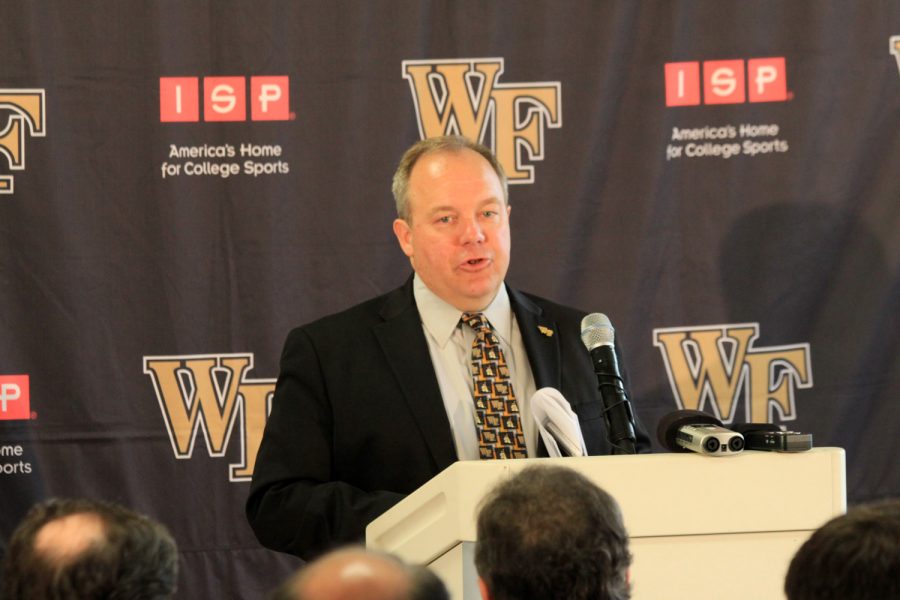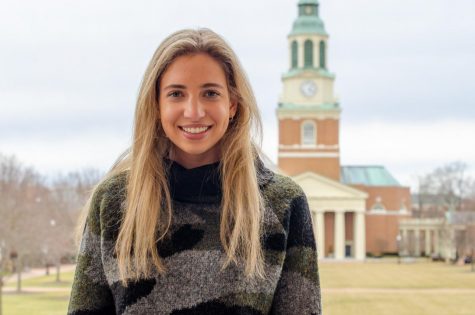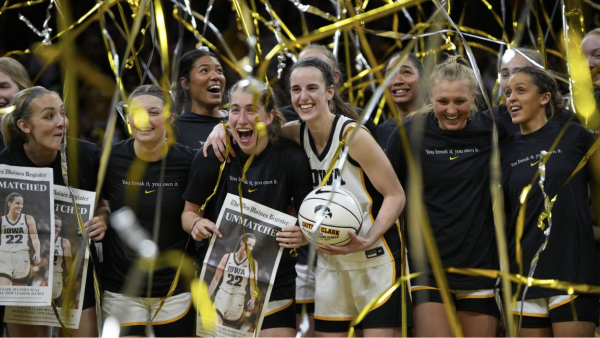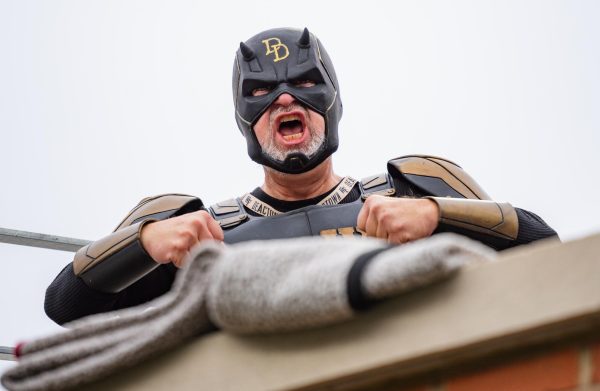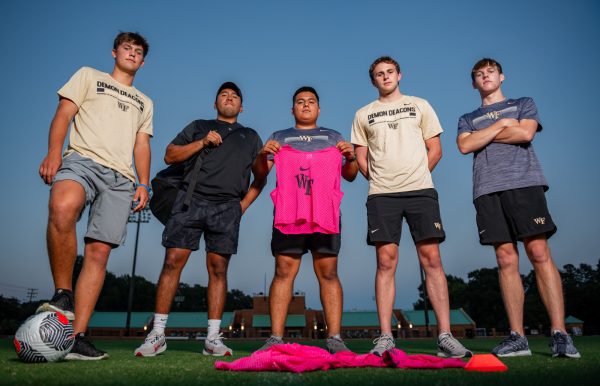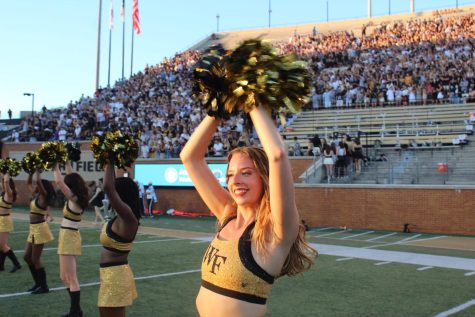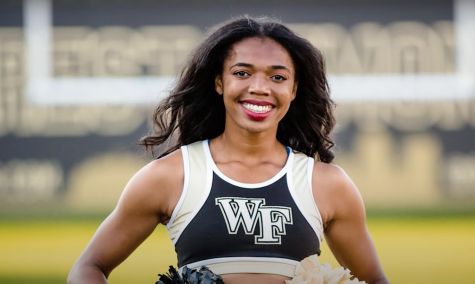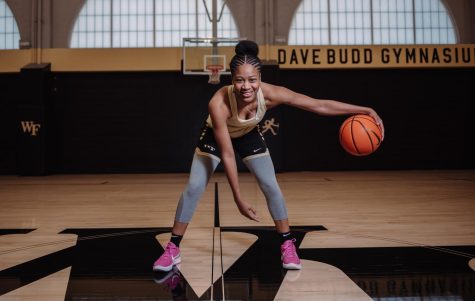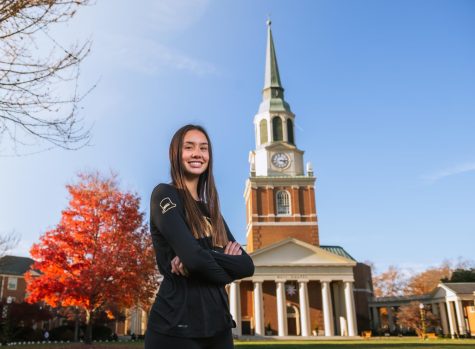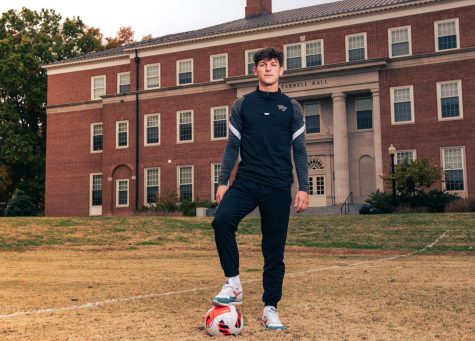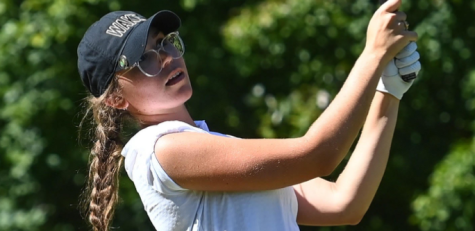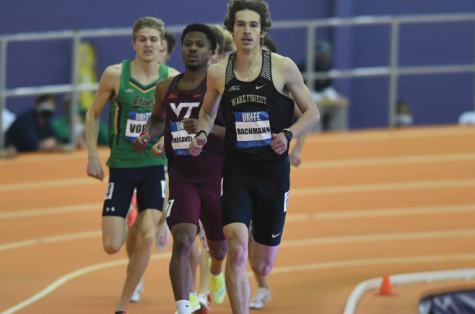Deacon Spotlight: Steve Shutt
October 29, 2020
Steve Shutt is the Wake Forest Associate Athletic Director for Athletic Communications, and, after 13 years at Wake Forest, he will retire on Oct. 31. Shutt graduated from Bowling Green State University with a bachelor’s degree in Journalism in 1980. Since, Shutt has spent 40 years in the Media Relations field, and, while at Wake Forest, has helped document two NCAA championship teams, 10 ACC championship teams, five national players of the year, 76 All-Americans and eight football bowl teams. Shutt is the second-longest serving athletics communications director in Wake Forest history.
Christina DeNovio: How would you describe working in the field of college athletics media relations?
Steve Shutt: I think it has been tremendously rewarding. It’s been 40 years in the field. I’ve met phenomenal coaches, administrators, student athletes. I’ve been around long enough that some of the young people that were All Americans when I worked with them now have children who are all Americans.
CD: At what point did you realize that you wanted to enter the field of sports communication?
SS: My junior year in high school, maybe my sophomore year. I was playing football and baseball in high school, and I enjoyed writing. I was taking a journalism class, and the teacher said that there was an opening for a sports writer at a local newspaper, and so I was able to get that job. I knew that writing and sports would be a part of my life. When I got to college, I was cut from the baseball team, so I went to work in the sports information office and really haven’t done anything else since then.
CD: How did you come to work at Wake Forest and how did you end up as the Associate Athletic Director?
SS: Every school in the country has an Athletics Communications Department, whether it’s a small school or a major school, like Ohio State. The goal of that department is to create publicity and get the word out about what is going on in athletics. Universities also have their university PR departments, which tell the story of the great professors and things, but outside of graduation there’s no event that the university side puts on that’s going to draw 30,000 people to campus. You’re not going to draw fans to a chemistry lecture. Back in the ’30s and ’40s, universities realized that athletics were a great vehicle to promote their university. I’ve said for years ‘I can’t tell you what a good major at Nebraska is, but I can tell you about their football team.’ That’s how most people identify universities. I had worked at a number of different schools. I started off at Indian River Community College down in Florida. I went to return to my alma mater at Bowling Green. I went to New Mexico State University. I did a short stint in Corporate PR, then to the Southern Conference office, then to Wofford. I was at Wofford when the Wake Forest job opened, and I knew some of the coaches, and they helped me land an interview in 2007. I interviewed; they offered me the job, so I’ve been here since 2007.
CD: How would you describe being a part of the Wake Forest athletics community?
SS: Wake is such a special place. So many great people, great coaches, student athletes. They’re outstanding people; they have a lot of compassion. They have a lot of empathy. They care about their studies; they care about the community. It’s just been wonderful to work in that environment. The number of former student athletes who have reached out to me in the last week has just been astounding. It has been very heartwarming, and it reaffirms that Wake Forest is a great place.
CD: How is Wake Forest different from the schools you worked at previously?
SS: Wake Forest has the highest standard of any university that I’ve worked at. It also competes at the highest level. We regularly get victories not only over ACC schools but also we’ve beaten Ohio State. We beat Ohio State to win the soccer national championship; we’ve beat Ohio State to win the tennis national championship. Most people will equate Ohio State as being at the top of the athletics food chain. Our past two national championships have come by beating Ohio State, which shows that Wake Forest can compete at any level. I think in a lot of cases we have an underdog mentality because Wake Forest isn’t typically picked to be the best in the nation (with the exception of men’s soccer and men’s tennis) and yet Wake Forest consistently overachieves and does very well. That it is a tribute to the great coaches, the great student athletes and the great administrative support that the athletic program receives.
CD: What was your most fond memory from your time at Wake Forest?
SS: The best story that I worked on was when the baseball coach, Tom Walter, donated one of his kidneys to his player, Kevin Jordan. That was back in 2011. Kevin wound up starting to play in 2012. That was the best story that I worked on in my thirteen years here. There are a lot of close seconds — any of our bowl wins, basketball wins over Duke and North Carolina, great soccer victories, women’s golf. There have been so many great memories over the last thirteen years.
CD: Which sporting events stand out as the most memorable?
SS: We beat Duke in basketball in last second shots by James Johnson. It must have been Jan. 28, 2009 when we beat Duke 70-68. That game stands out. [In] 2017, the baseball regional when we went undefeated through that. The atmosphere at the ballpark was phenomenal. Six thousand people there. In ’07 beating Florida State in football on a Thursday night ESPN game was a great win and a great atmosphere, too.
CD: In what ways did your relationships with coaches and athletes impact you personally, and professionally?
SS: I think I learned an awful lot from them. I think I was also able to help them. I had a close relationship with one particular coach, who was at Wake Forest, and that was probably instrumental in me getting the job. That was Mike Peterson. Mike had been the women’s basketball coach at New Mexico State when I worked there. Mike and I had a great relationship, and he eventually became the head coach at Wake Forest while I was at Wofford. We stayed in touch, we got together and played golf. I saw that this job had opened up, and I called Mike and talked about it. He put in a good word for me, and that, I think, led to me getting the job. Tom Walter has shown me that you can be a great coach and a great human being. The same with Jim Grobe. Jim Grobe was a great human being and a great coach. Dave Clawson is a really good fit for Wake Forest, too. He understands Wake Forest, and he brings in the right student athletes that are good football players and also fit into what Wake Forest is looking for. Bobby Muuss and Tony Bresky are the same way. Jerry Haas is another great person and a great coach, as is Kim Lewellen. I’ve learned a lot from them. Hopefully I’ve helped them in dealing with sticky situations that have come up, and hopefully it’s been mutually beneficial. I certainly have learned a lot about coaching and Wake Forest through our coaches.
CD: What will you miss most about your job at Wake Forest?
SS: Being in the press box on football Saturdays. Now, this year is different. Because of COVID, you don’t have the fans, you don’t have the media, you have restrictions. I remember some football games where we would have as many as 38 football scouts request credentials to come to the game, particularly those versus Clemson and Florida State. Wake Forest had some NFL prospects, and Clemson would have some NFL prospects, and we had a lot of NFL scouts who wanted to come to our games. I miss arranging the interviews postgame. You’re down on the field, and the camera crew says “We have to talk to the head coach” or “We need to talk to this player.” Trying to maneuver through both teams shaking hands, trying to find that particular player, trying to maneuver them in front of the camera for an interview. Those are the kind of things that I’ll miss. This is a different kind of year, so it’s not impacting me as greatly as I would have thought it would.
CD: What are your plans for the future, and do you intend to continue your relationship with the Wake Forest athletic program?
SS: I plan to stay in Winston-Salem, because as a community, Winston-Salem meets all of my needs. Anything that I want is here, so I don’t feel the need to live in a larger city like Raleigh or Charlotte. I plan to do some writing; my degree is in journalism, and I’ve spent a career writing essentially brief news releases, a few long form stories. I’ve met some wonderful people throughout my career that I think would be fantastic book subjects. I’m working on some book deals right now to do some stories on the people who have had a great, positive impact on Wake Forest and some that aren’t even sports related. Things that I’ve seen and things I’ve experienced throughout my career, people I’ve met. I hope to be able to tell their stories through books.


